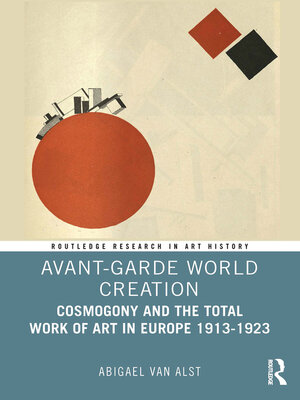Avant-Garde World Creation
ebook ∣ Cosmogony and the Total Work of Art in Europe 1913-1923 · Routledge Research in Art History
By Abigael van Alst

Sign up to save your library
With an OverDrive account, you can save your favorite libraries for at-a-glance information about availability. Find out more about OverDrive accounts.
Find this title in Libby, the library reading app by OverDrive.



Search for a digital library with this title
Title found at these libraries:
| Library Name | Distance |
|---|---|
| Loading... |
This book explores the widespread fascination with world creation among early twentieth-century artists and examines those trends within the European avant-garde.
The book reflects on what 'the world' looks and feels like before and after World War One—and thus also concerns creativity and destruction alike in the context of modernity. Over the course of three chapters, the author focusses on works in which avant-garde artists combine and experiment with various arts and media to create alternative narratives of the world's creation. These works include three canonized 'total works of art': Der Weltbaumeister (The World's Master Builder, 1920), an illustrated book imagined as an architectural play by the Expressionist architect Bruno Taut; the Futurist opera Победа над Cолнцем (Victory Over the Sun, 1913) by Aleksei Kruchenykh, Velimir Khlebnikov, Kazimir Malevich and Mikhail Matiushin; and the Cubist ballet La Création du monde (The Creation of the World, 1923) by Blaise Cendrars, Fernand Léger, Darius Milhaud and Jean Börlin. Providing new readings of these classic works that dive deeply into the avant-garde's inter-artistic search for new modes of mediation as well as its dialogue with science, politics and technology, Abigael van Alst demonstrates how each of these artworks staged a cosmogony—an alternative story of the universe's creation—which, simultaneously, experimentally and critically recounted the story of modernity.
This new book is ideal for researchers and scholars in History of Art, Modernism, and Comparative Literature.







